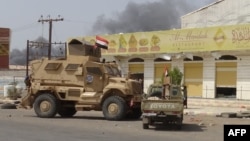Yemeni rebels launched fierce barrages of mortar fire Friday as they battled to slow an advance by pro-government forces deeper into the port city of Hodeida, military sources said.
The Shiite Huthi rebels, whose chief has vowed his troops would never surrender despite being vastly outnumbered, shelled government positions in the south of the Red Sea city, loyalist officials said.
But despite the "intense attacks," loyalist forces, backed by a Saudi-led coalition, made fresh advances in eastern sectors of Hodeida.
Eight days into the renewed offensive, civilians reported relentless air strikes, low-flying jets and Apache helicopters, mortars and missiles on the outskirts of the city and within five kilometers (three miles) of its strategic port, the Norwegian Refugee Council said in a statement.
The Iran-backed rebels, for their part, said their fighters had cut off government supply routes in four sectors of Hodeida province, although there was no confirmation from the loyalist side.
Backed by Saudi air raids, loyalist troops for the first time entered residential neighborhoods on Thursday, using bulldozers to remove concrete road blocks installed by the rebels.
Nearly 80 percent of Yemen's commercial imports and practically all UN-supervised humanitarian aid passes through the port.
The Huthis have controlled Hodeida since 2014 when they overran the capital Sanaa and swept though much of the rest of the country, triggering the intervention by the Saudi-led coalition the following year and a devastating war of attrition.
The rebels have since been driven out of virtually all of the south and much of the Red Sea coast.
Coalition to 'capture' port
Government forces launched their offensive to retake Hodeida in June backed by significant numbers of Emirati ground troops.
Their advance into the city of some 600,000 people has been slowed by rebel-dug trenches and minefields in a battle which has intensified since November 1. A total of 250 combatants have been killed this month — 197 Huthis and 53 loyalists, medical and security sources say.
The Norwegian Council warned further fighting could cut off roads between Hodeida and Sanaa.
"There is now only one viable overland route from Hodeida city to Sanaa, and a very high risk that further aerial or land attacks on roads or bridges could sever access roads between the cities entirely," it said.
This would result in "cutting the last remaining supply route for food, fuel and medicine to many of the estimated 20 million Yemenis who depend on imports through Hodeida."
IHS Markit Middle East senior analyst Ludovico Carlino said he expected Saudi and UAE coalition forces to step up their assault in the coming days and "capture" the port before any talks start.
"Saudi Arabia and the UAE consider the capture of Hodeida as an essential precursor to any peace talks with the Huthi movement, as this would allow the Yemeni government to have much more political leverage at the negotiating table," he said.
"As such, fighting for control of the port will probably begin in earnest over the coming days, and intensify thereafter," Carlino said, warning the Huthis could "sabotage" facilities at Hodeida port if forced to retreat.
Both the United States and the United Nations are pushing for peace talks on Yemen to take place by the end of the year.
'Mass starvation'
Salem Jaffer Baobaid, an aid worker for Islamic Relief charity in Hodeida, painted a bleak picture of daily life in an account published by the humanitarian news agency IRIN.
"Lately the fighting is edging closer to the city centre and I can hear it. Few people sleep through the night, and I can see the exhaustion and anxiety on my neighbours' faces," he said.
Food packs last only two weeks and "sallow skin and sunken eyes — both signs of malnutrition — are clear indications that the people of Hodeida and Yemen can't take much more," added Baobaid.
UN agencies say some 14 million people are at risk of famine in Yemen — described as the world's worst humanitarian crisis, with the World Food Programme saying it will nearly double food aid to the country to avert "mass starvation."
Unless the war stops immediately Yemen "will become a country of living ghosts, its people reduced to sacks of bones," it warned.
Nearly 10,000 Yemenis have been killed in the conflict since 2015, according to the World Health Organization. Human rights groups say the real death toll may be five times higher.
In Istanbul on Friday a conference held under the aegis of Yemeni Nobel laureate Tawakkol Karman called for concrete measures to end the war and an international court to judge those charged with crimes during the conflict.

